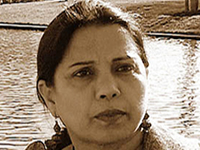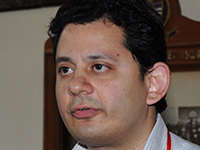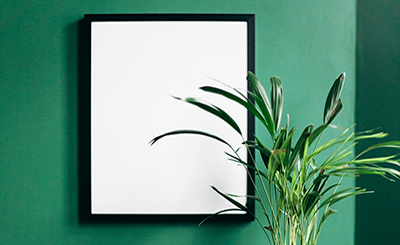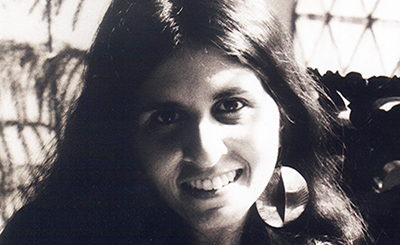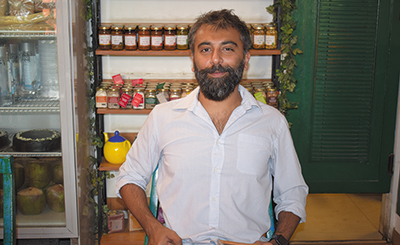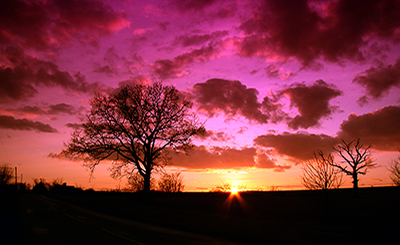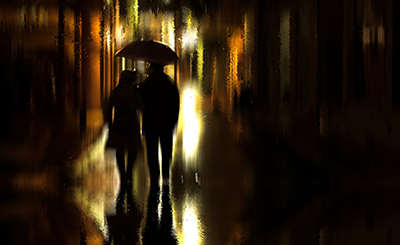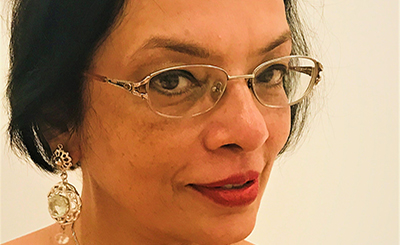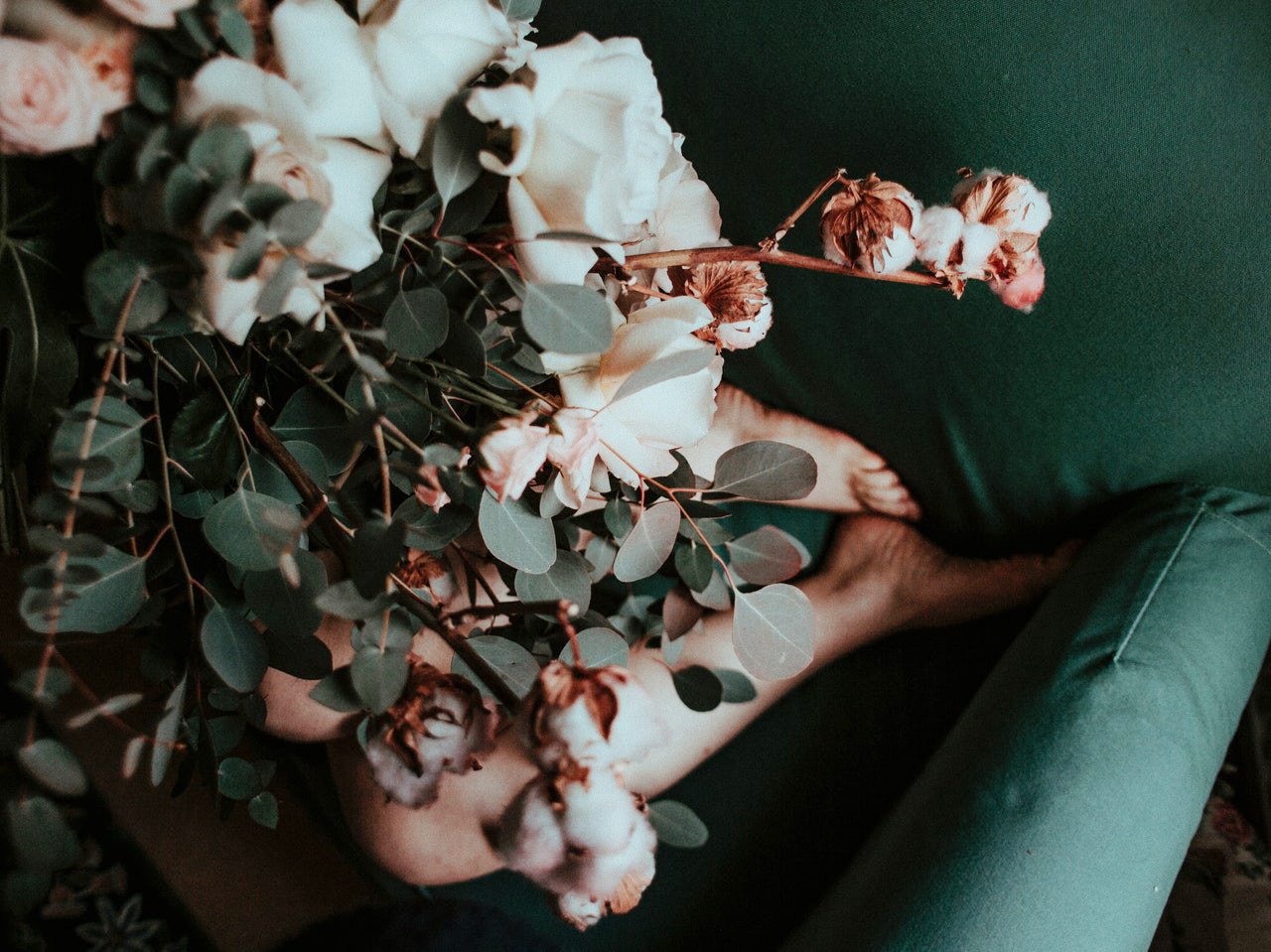
Translator’s Note: One of my favourites among Ishrat Afreen’s poems is Intesaab (Dedication) for its ‘take-no-prisoners’ attitude and its direct evocativeness: Mera qad/Mere baap se ooncha nikla/Aur meri maa jeet gayi (I grew taller than my father/My mother had won.) Another poem Gulaab Aur Kapaas (Roses and Cotton) positions her more in the tradition of the progressive writers, especially Makhdoom, who sought to see beauty in labour and valued women’s labour through traditional invocations of beauty. Afreen takes the metaphors much further, though, positioning them directly against the ephemeral concept of beauty associated with privilege. Then in another short poem Aadam Ki Maan (Adam’s Mother) she sums up the dilemma of Aqleema, Cain’s sister who according to some versions of the Biblical/Islamic tale had desired her for himself although she was forbidden to him:
Havva
Aadam ki zauja
Aur__ Aqleema?
(Eve
Wife of Adam
And__ Aqleema?)
Aqleema, who was denied a voice in deciding her own fate, finds a kindred sister in Ishrat Afreen who herself ends her maiden collection Kunj Peele Phoolon Ka on the couplet:
Yeh chand haroof bhi ik umar ki kamaai hain
Ke ghurbaten hi viraasat mein hum ne paayi hain
(These few words too are the earnings of a lifetime
In that poverties are very much what we have obtained in inheritance)
Being a woman in a patriarchal society also means confronting — and conveying — rude truths from one generation to another, as Ishrat Afreen narrates in her poem Aik Sach (A Truth). This is how she introduces herself for the uninitiated, in her poem Mein (Me):
Yehan aake qabile ki
Saffaak larki
Teri dastaras se
Bohat door hai
(This cruel girl
From the tribe of ego
Is very far
From your reach.)
Lastly, my favourite couplet from her poetry:
Apni chador ko parcham kar sakti hai
Aurat ik tareekh raqam kar sakti hai
(From her chador a flag she can make
A whole history can a woman narrate)
Her latest poem offers a fresh trauma of a creative soul who has not been able to accept her adopted country as her home,partly because her current home does not give her the recognition she so richly deserves. In my humble opinion, the identity crisis of the poet becomes at with identity crisis of her native country in her latest poem Shanakht (identity).
*All the traslations from the Urdu are by Raza Naeem.
Roses and Cotton
These girls who toil in the fields
Whose golden skin has been dyed dark by the sun
Who sleep on beds of frost and dew at night
And are burned by the sun in the day.
They are much prettier than those statues
Sitting on marble benches
On green lawns
Prettier and more different
Than those whose tresses are adorned with roses and
jasmine buds
And who run wild in a sharp profusion of colours.
The girls who pluck sunlight in the farms
Are also at the green threshold of the new era, but
Do not even look at mirrors
They are unfamiliar with the sharpness of rose and
juhi
They pluck the flowers, but do not wear them
Their clothes carry the pungent scent
Of mustard flowers instead
And their eyes the brightness of cotton.
A Truth
(On the International Day of Women
I, reading out my new poem to my daughter
Looked at her desiring appreciation
That moment
Her eyes
Carried such a taunting smile
As if saying to me
Mother you are such a liar!)
Birthday
I think in times past
Those who were weak in counting
Used to have quite a blast.
Who used to link the birth of children
With the years of flood and contagion.
Then in the village
Until there lived a man of old age
The remaining people of the village wer every much known as children
Now this counting of years and months
Has made us into old women.)
Identity
Nobody knows me here
People say
Do you also write poetry
Really! What do you write
We have never seen you
Your husband is a celebrity
He is known to the whole city
There is not a desi in this city
Who has not bought a car from him.
I too smile spontaneously
We who have been for thirty years in this city
When we go together to the bazaar
People hurriedly greet him
Nobody knows me here.
When I return to my native country
How I am welcomed there tremendously
I think to settle here permanently
People arrive in droves to interview me relentlessly
But there too is this difficulty
That people do not inquire delicately
Have you gotten any national honours?
Your ghazals
Have been sung by how many performers?
They get very disappointed
Hearing my response.
It’s my golden jubilee
Of versifying triumphantly
And here too is my situation
Nobody knows me.)
The essay and the poems are part of our Poetry Special Issue (January 2022), curated by Shireen Quadri. © The Punch Magazine. No part of this essay or the poems exclusively featured here should be reproduced anywhere without the prior permission of The Punch Magazine.
More from The Byword
Comments
*Comments will be moderated



